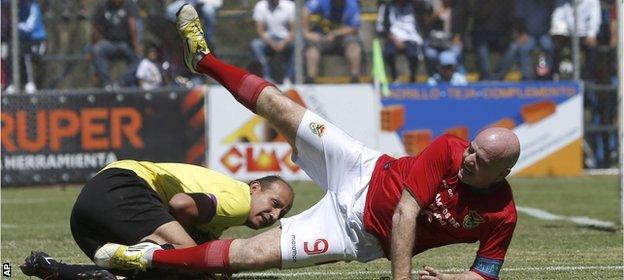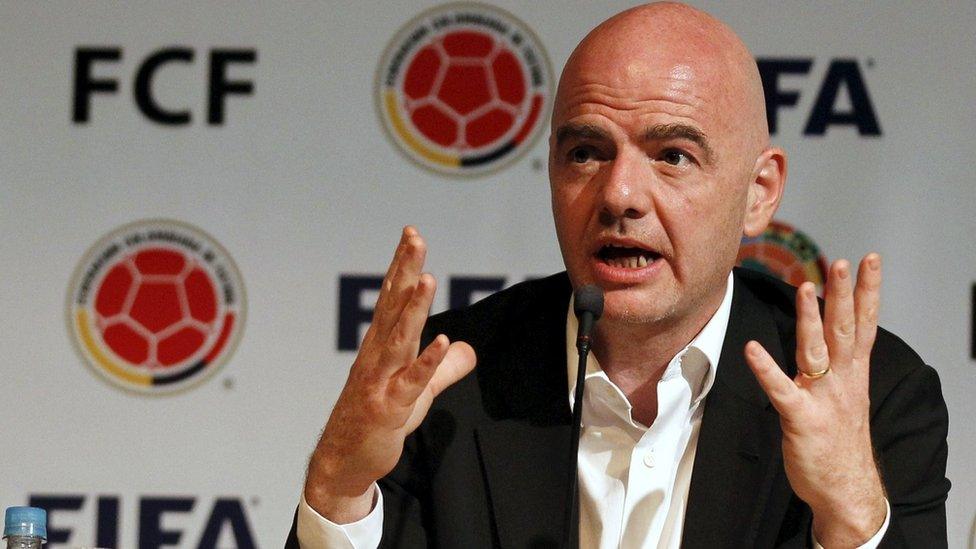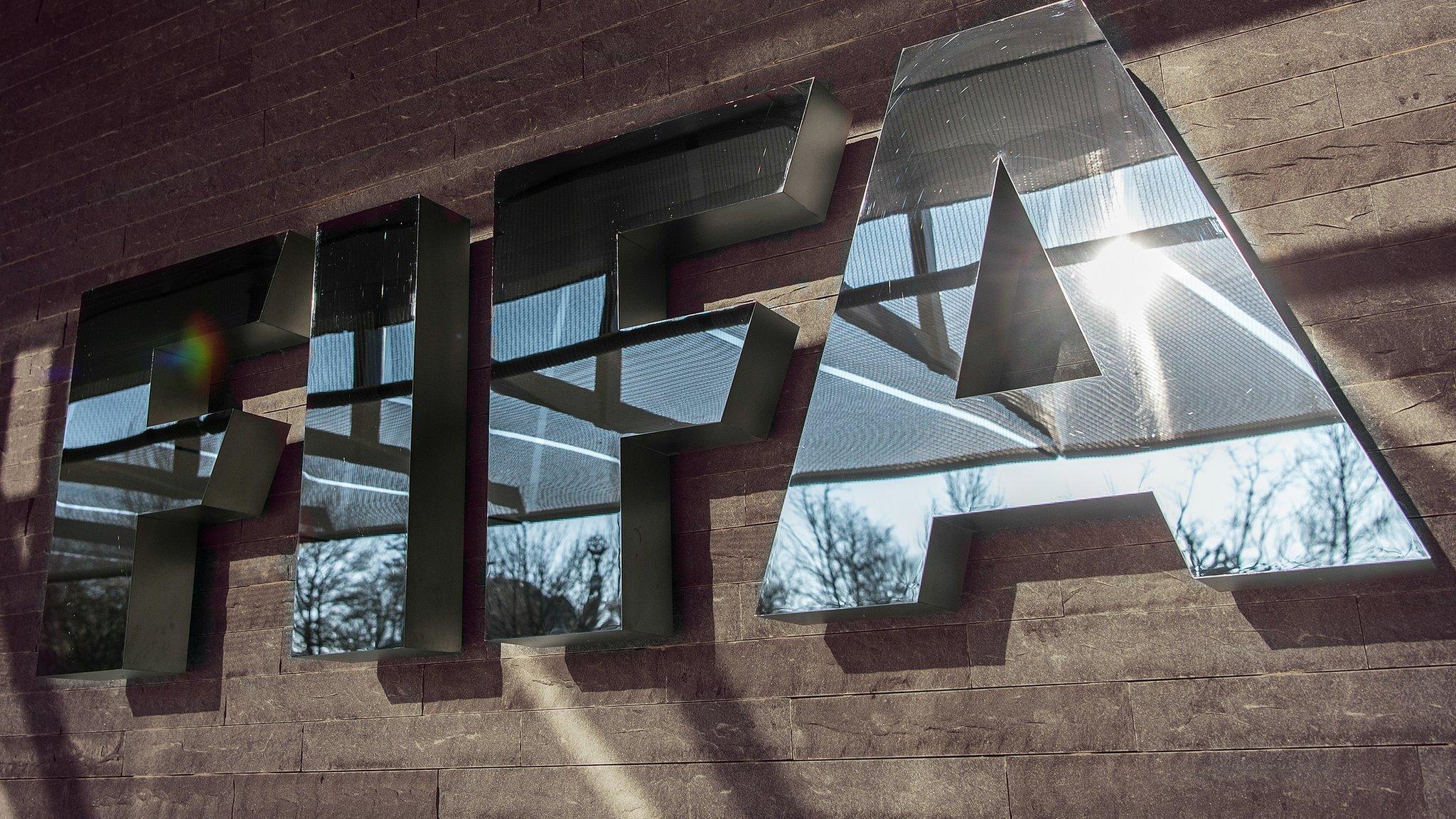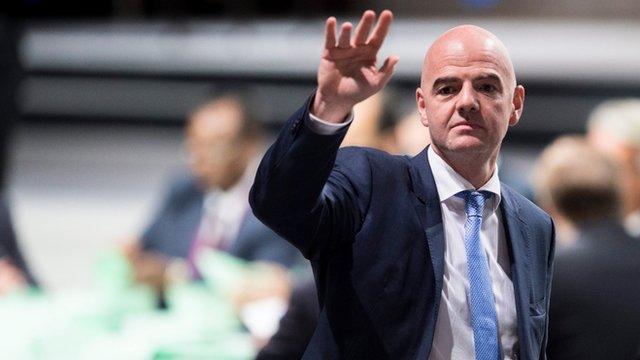Panama Papers: Fifa president Infantino 'dismayed' by media reports
- Published
A contract signed by Fifa's new president is named in the Panama Papers, as BBC sports editor Dan Roan reports
Fifa president Gianni Infantino has denied wrongdoing after leaked documents suggested he signed off on a contract with two businessmen who have since been accused of bribery.
Hugo and Mariano Jinkis bought TV rights for Uefa Champions League football and immediately sold them on for almost three times the price.
The 2006 contract was signed off by Infantino when he was a Uefa director.
Infantino says he is "dismayed" that his "integrity is being doubted".
News of the contract came to light after 11 million documents were leaked from the Panamanian law firm Mossack Fonseca.
Uefa initially denied doing business with any of the 14 people who have been indicted by the FBI in its investigation into corruption in world football.
It has now told the BBC the TV rights were sold to the highest bidder in an open and competitive tender process.
A senior Fifa source has told the BBC the deal should be examined by the governing body's ethics committee in the interests of transparency.
What is this all about?
Hugo Jinkis and his son, Mariano, are fighting extradition from Argentina to the United States.
In May 2015, US prosecutors alleged that, as the owners of Cross Trading, they paid millions of dollars in bribes to South American football officials over several years in order to gain lucrative television rights for regional football tournaments.
It is claimed the money was paid to senior football officials in exchange for cheap broadcasting rights that could then be sold on for a substantial profit.
Infantino is named on a contract with Cross Trading that concerns the Ecuadorian rights for Uefa Champions League football between 2006-7 and 2008-9.
Cross Trading, an offshore company registered to the tiny Pacific island of Niue, paid $111,000 (£78,000) for those rights.
Then, according to leaked documents, it sold them to Ecuadorian TV broadcaster Teleamazonas for $311,170 (£220,000).
Cross Trading also paid $28,000 (£20,000) for the rights to the Uefa Super Cup, selling those to Teleamazonas for $126,200 (£89,000).
There is no evidence to suggest Infantino received a bribe relating to the 2006 contract with Cross Trading, and no suggestion Teleamazonas was in any way complicit in any wrongdoing.
At the time, Infantino was the director of legal services with European football's governing body, Uefa.
Cross Trading also has links to Juan Pedro Damiani, a member of Fifa's ethics committee who has already been placed under internal investigation.
More from the Fifa crisis | |
|---|---|
What is Uefa's response?
Uefa insists it has done nothing wrong and dealt with Cross Trading because the company was acting as the buying agents for Teleamazonas.
A Uefa spokesman said the rights were sold following an "open, competitive, tender process".
He added the bid from Teleamazonas was accepted because it was "considerably more" than that from a rival broadcaster.
The spokesman added what Teleamazonas then did with those rights was "their business, not ours".
Uefa points out the Cross Trading contract was one of many hundreds of deals it conducts in relation to Champions League TV rights and comprises a tiny amount of its overall income.
It also stressed it has been "conducting a review of its various commercial contracts" following the US indictments in May 2015.
"The TV contract in question was signed by Gianni Infantino since he was one of several Uefa directors empowered to sign contracts at the time," added a Uefa statement.
"As you will have observed, the contract was also co-signed by another Uefa director. It's standard practice."
Uefa issued a further statement later on Tuesday calling Infantino "an outstanding member of Uefa staff for many years" and "a man who has always acted with complete professionalism and integrity".
It also sought to explain why it had initially denied having dealings with any of the 14 people originally indicted by the FBI.
"At the time of our initial response, we had not had the opportunity to check each and every one of our (thousands) of commercial contracts and so the answer given was initially incomplete," read a statement.
"That is the reason why Gianni Infantino initially thought, based on the information provided by Uefa, that there had been no previous Uefa contracts with any companies and/or individuals named in the indictment.
"That is also why Fifa gave this information to the media."
What does Infantino say?
As well as being "dismayed" and upset that his "integrity is being doubted", he said he reacted quickly to media enquiries by contacting Uefa "to seek clarity".
He added: "I did this because I am no longer with Uefa and it is they who exclusively possess all contractual information relating to this query.
"In the meantime, Uefa has announced that it has been conducting a review of its numerous commercial contracts and has answered extensively all media questions related to these specific contracts."
Infantino insisted he had "never personally dealt with Cross Trading nor their owners" because the tender process was conducted by Team Marketing on behalf of Uefa.
He added: "I would like to state for the record that neither Uefa nor I have ever been contacted by any authorities in relation to these particular contracts.
"Moreover, as media themselves report, there is no indication whatsoever for any wrongdoings from neither Uefa nor myself in this matter."
What happens now?

Infantino played in a charity game in Bolivia shortly after his appointment as Fifa president
The revelations are potentially damaging for both Infantino and Fifa.
It is also the second setback for world football's governing body in recent days.
Damiani is facing an internal investigation, external into suspected links with Eugenio Figueredo, another allegedly corrupt football official.
Infantino became president of Fifa on 26 February, succeeding Sepp Blatter as boss of world football's crisis-hit governing body.
On his election, the former Uefa general secretary pledged to "restore the image" of Fifa.
While neither Uefa nor Infantino have disclosed the Cross Trading transaction to the FBI - both pointing out they have not been contacted by the US agency over the deal - Uefa said it would co-operate or provide information in connection with a US Department of Justice investigation.
As for Hugo and Mariano Jinkis, a lawyer acting for the father and son did not reply to a request for comment.
How did we find out about this?
It is down to a leak of more than 11 million documents from the internal files of Mossack Fonseca.
Mossack Fonseca is a Panama-based law firm that specialises in helping the wealthy and powerful set up offshore companies, like Cross Trading.
The documents were obtained by the German newspaper Suddeutsche Zeitung and shared with the International Consortium of Investigative Journalists.
BBC Panorama and the Guardian newspaper are among 107 media organisations in 78 countries that have been analysing the documents.
Panama Papers - tax havens of the rich and powerful exposed
Eleven million documents held by the Panama-based law firm Mossack Fonseca have been passed to German newspaper Sueddeutsche Zeitung, which then shared them with the International Consortium of Investigative Journalists., external
BBC Panorama is among 107 media organisations - including UK newspaper the Guardian, external - in 76 countries that have been analysing the documents. The BBC does not know the identity of the source.
They show how the company has helped clients launder money, dodge sanctions and evade tax.
Mossack Fonseca says it has operated beyond reproach for 40 years and never been accused or charged with criminal wrongdoing.
Tricks of the trade: How assets are hidden and taxes evaded.
Panama Papers: Full coverage; follow reaction on Twitter using #PanamaPapers; in the BBC News app, follow the tag "Panama Papers".
Watch Panorama on the BBC iPlayer (UK viewers only).
- Attribution
- Published6 April 2016

- Published3 April 2016

- Published26 February 2016

- Published20 June 2016

- Published7 June 2019

- Published2 November 2018
